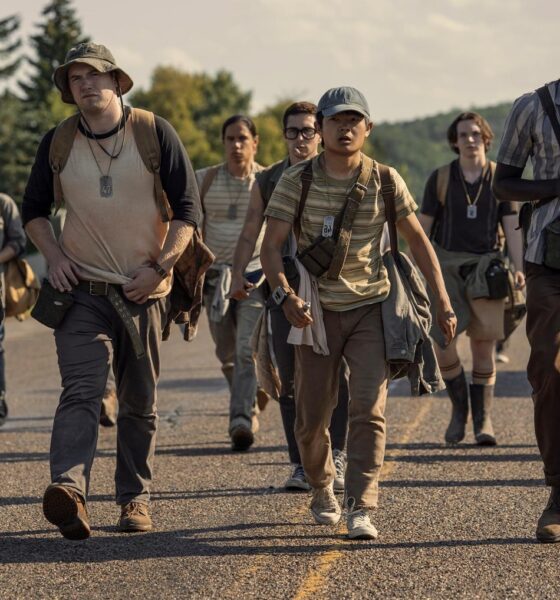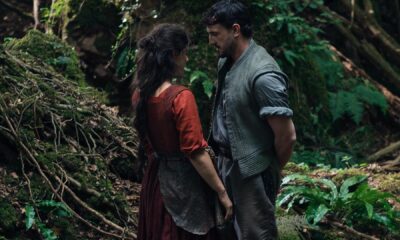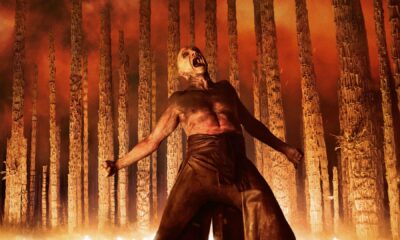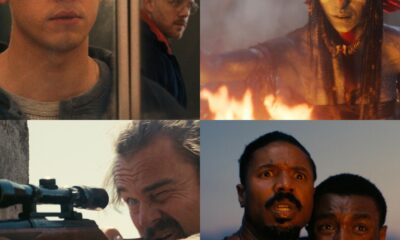

Features
The World’s End? How The Long Walk/The Mist Mirror Today’s Society
It may be rather obvious to say but these are dark, divided times. It may even feel as if this is as bad as it’s ever been, but the reality is, things have always been divided. People have always drawn up battle lines and major events have always polarised people. It’s in these times that we look to art to reflect where we are as a society so it’s no surprise that there are a slew of films reflecting the very darkness infesting our souls. Most recently Francis Lawrence made The Long Walk, an adaptation of Stephen King’s 1979 novel of the same name.
Surprisingly, while certain elements have been changed the film remains very true to the book. Both take place after an unspecified war has decimated America, forcing young men to walk for a supposed cash prize and one wish. When King wrote the novel he was commenting on the very real Vietnam war which had taken young men and forced them into a deadly political situation they were not prepared for. But director Lawrence, however, is speaking to a culture war, one that has only intensified since COVID-19.
As with any dystopia, you write about the future but you comment on the present. King was addressing the sense of nihilistic waste that came from the war in Vietnam and the angry response people had to veterans of the war. The novel’s wish a cruel joke on the poor young men who risked their lives only to be given nothing but anger and hatred upon their return. Now, the story is very much about Trump’s America where young men are pitted against each other – are you an Alpha or a Sigma – the type of rhetoric that dominates the online sphere.

The young men of The Long Walk long for camaraderie and connection, most clearly seen in the growing bond between Ray Garraty (Cooper Hoffman) and Peter McVries (David Jonsson). We live in a era where there is a so-called Male Loneliness Epidemic, suicide remains the largest killer of men in the age bracket of people the film focusses on but ultimately any bond these men form is going to be cut short by the very nature of the competition. As untenable as the friendships are, they are vital for the mental wellbeing of those on the walk and this juxtaposition of something essential but ultimately doomed is something we see all too much in society.
People like The Major stand as an authority that promises riches will cure the problems of the young men, his empty platitudes during the walk, commending the men for having “heavy sacks” and “guts” play into the stereotype that virility is what matters to men. It’s not hard to see parallels between The Major’s constant referring to the manhood of the walkers to rhetoric about being a “real man” that the likes of Andrew Tate make.
In a very similar way The Long Walk sits alongside another Stephen King adaptation as a comment on where the world was at the time – The Mist. Frank Darabont’s 2007 horror film was about a group of New Englanders taking refuge in a supermarket when a large fog rolls into the town and unleashes Lovecraftian monsters. While the trappings seem like pure King fantasy, his 1980 novella, and the 2007 adaptation, are again about the wider society as a whole. As time goes on in the store, and people begin to give into fear they turn on each other. The story’s main message is that the true monsters are the ones we live with, the ones we call neighbours.
Outside of the monsters the main antagonist is Marcia Gay Harden’s Mrs Carmody, a religious zealot who whips the frightened patrons into a frenzy, offering them fire and brimstone sermons and demanding they repent. At the time of the film’s release the news was still very much about the War in Iraq, and Darabont – who incidentally held the rights to The Long Walk for many years – comments on the general aggression and fear in society. In the film as neighbours turn on one another the growing angry mob set their sights on local soldiers as the reason to seek blame, stating that their local base brought about the monsters in the mist.

While King’s novella again was drawing on the post-Vietnam era hatred towards the military the film is very much about the growing sentiment of anger at the War in Iraq. It was a time of polarised opinions and the young soldiers who were perhaps sold a lie were used as a scapegoat for the actions of the superiors. In the film the patrons of the store stab one soldier and carry him out into the mist to be dragged away by creatures. He’s attacked and left for dead for what he is, not what he has done, a sentiment many soldiers could relate to.
The Mist also comments on the widening gyre between people. Everyman David Drayton (Thomas Jane) faces a crises in protecting his young son from the increasingly angry rhetoric of Mrs Carmody who demands blood sacrifices to appease a vengeful God. In doing so Darabont draws a parallel between her and media figures who use faith as a means to spread fear and hate. In both their roles The Major and Mrs Carmody embody the authorities that dominate the popular consciousness.
It’s also interesting that both antagonists are shown to be corrupt and hypocritical. At one point it is revealed that The Major sleeps and showers while the walk is happening, showing he does not endure what the walkers and the soldiers hired to watch them have to endure. Similarly, despite being a person of faith when the hand of friendship is extended to her, Mrs Carmody rebuffs it telling local teacher Amanda (Laurie Holden) that “the day I need a friend like you, I’ll just have myself a little squat and shit one out”. Mrs Carmody also demands that David’s young son Billy be sacrificed to please God and save them from the monsters, not caring that he is innocent in everything. Neither uphold the principles or values they extol, which speaks to leaders of the time. President Bush was considered a deeply religious man but exercised zero restraint when he invaded Iraq, while President Trump is notorious in his bold claims about his health while being entirely unfit both physically and mentally.
Where The Mist and The Long Walk both truly connect is in relation to their source novels, and the changes to their endings. Both films have become infamous for their bleak endings. Both of King’s sources have dark but ambiguous endings. The Mist ends with the implication that there may be hope yet, while The Long Walk has Garraty continue to walk believing there is someone ahead of him despite him winning. The changes dispense with ambiguity and the question of hope for something nihilistic. The choice for Darabont to have David kill his fellow survivors, including his son, only for the mist to clear and the army to come thus implying Carmody was right the entire time, ending with David screaming in anguish has become the stuff of legend.
But it speaks to a feeling of hopelessness. A direct comment on 9/11 the army could only help after the fact, after mass tragedy, and David’s hysterical screams as the military to look on confused speaks to the feeling that there was nothing truly to be done after the Towers came down. The nation was in pain and the army coming in after the loss to clean up wasn’t enough. The War on Terror was not the cathartic thing people needed, it was a reaction to pain but it couldn’t dispense with the tragedy the same way the innocent people in the car with David were killed and couldn’t be saved.
Similarly swapping the winner of the walk from the revenge driven Garraty to the hopeful McVries is an interesting one. Garraty sees the optimism and hope that McVries has and allows himself to die so that a better man can change the world and yet when faced with that pain, instead of letting it go McVries gives into the same rage and pain that drove Garraty and kills The Major. Similarly there was a chance after the lockdowns for people to bridge gaps and to learn from past mistakes and division, however, that has simply not happened. People are as divided as they ever were and people who you would think would want to extend friendship are closed off and angry. The corruption of McVries from someone who saw the good in life and the hope to giving into his pain and anger speaks to how people are unable to move on from the horrors of the past few years.
There may not be hope for us, and it may be saying something when the original work by King is the more uplifting version.
-

 Featured Review1 week ago
Featured Review1 week agoHamnet ★★
-

 News2 weeks ago
News2 weeks agoFull UK Line-Up Announced For 2026 Japan Foundation Touring Film Programme
-

 Movie Reviews6 days ago
Movie Reviews6 days agoPeople We Meet On Vacation ★★★
-

 Featured Review4 days ago
Featured Review4 days ago28 Years Later: The Bone Temple ★★★★
-

 Featured Review3 weeks ago
Featured Review3 weeks agoTeam MM’s Favourite Films Of 2025
-

 Movie Reviews2 weeks ago
Movie Reviews2 weeks agoThe Spongebob Movie: Search For Squarepants ★★
-

 Movie Reviews1 week ago
Movie Reviews1 week agoMarty Supreme ★★★★
-

 Movie Reviews1 week ago
Movie Reviews1 week agoThe Housemaid ★★★











